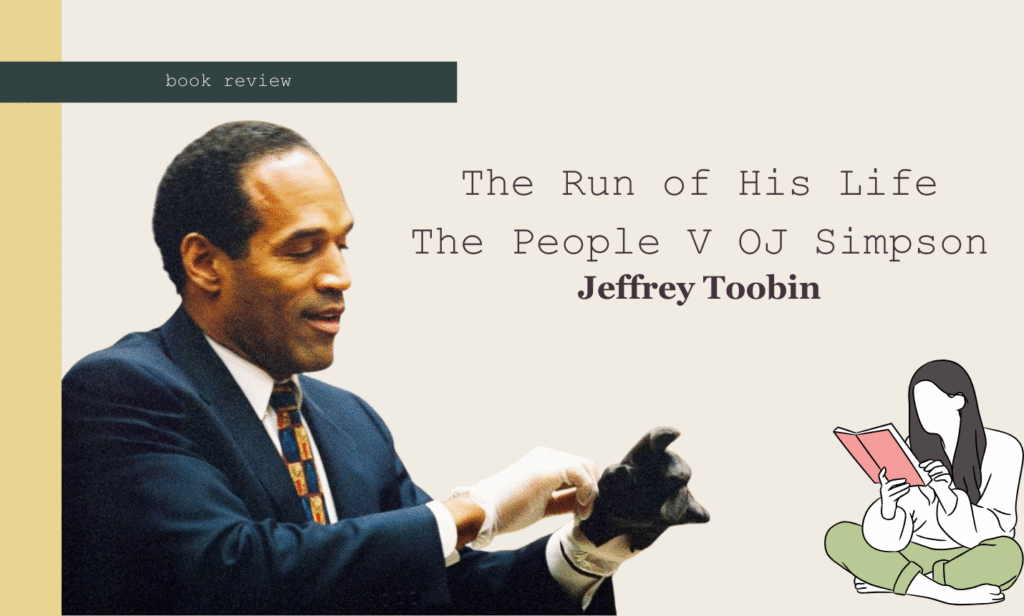
Review of Jeffrey Toobin's "The People vs OJ Simpson, The Run of his Life"

review by Daektilik editorial team
In the epilogue of his book, Jeffrey Toobin summarizes the civil trial (1997) at the end of which Orenthal James Simpson was found liable for the deaths of Nicole Brown Simpson and Ronald Goldman. And while one would think O.J. Simpson would silently disappear in the land of criminals who got away with murder, the verdict was the beginning of another trial starring the unapologetic ex-American football player. Ordered to pay nearly 35 million dollars to the families of his two victims, O.J. claimed bankruptcy. Today, he owes them as much as 58 million. Among the possessions Simpson gave away to avoid them being seized by the Goldmans’ lawyers were the trove of items OJ would stand trial in 2008 for stealing at gunpoint. At the end of this third trial, OJ was sentenced to 33 years in jail with eligibility for parole in nine years. Shockingly, or perhaps not so shockingly, he was granted parole and became eligible for release as early as October 1, 2017. He died in April of 2024 in Nevada.
In his remarks during the parole hearing, the man who was once found guilty of battery and abuse, the man who, when cornered under oath, took full responsibility for all the marks on his wife, the man who was found liable in the wrongful death of his ex wife and her visiting friend, that same man told the parole board: I’ve basically lived a conflict free life. A tad more delusional, he could get elected president of the United States. A guest on Jake Tapper’s Lead on CNN, Jeffrey Toobin, expressed his very articulate opinion on Simpson’s self-centered, detached persona: It was Simpson at his worst. Self-pitying, narcissistic, mouthing the words he was sorry, but clearly indicating he had nothing to be sorry for, and worse yet, saying he led a conflict-free life when he was a convicted and confessed domestic abuser. We all know Nicole Brown had called 911 repeatedly on him. Hence, the idea that he feels domestic violence is not really violence or not conflict, I think, is indicative of some of the attitudes we have seen throughout his life, which I thought was pretty bad, which takes us back to the Los Angeles criminal trial and Toobin’s book.
Toobin, a career prosecutor who was one of the legal reporters covering the criminal trial, wrote the book after the now-infamous not-guilty verdict and included a chapter (the epilogue) about the civil case. The book is really different from all those written by either members of the prosecution team and the Dream Team or those who would have given anything to be an active part of the show but weren’t lucky enough. In fact, Toobin has nothing to prove: he doesn’t need to rewrite the case for the prosecution, nor does he need to argue that every man has the right to a good defense under the law and that a reasonable attorney cannot reject clients based on whether public opinion and evidence are on their side or not. Toobin is an independent third party, someone who didn’t lose anything during the trial —neither his career, nor his credibility, nor his soul.
Toobin establishes a timeline not only of the murders but of the years that preceded the murders at the heart of the so-called trial of the century: he defines the settings of the story, the racially charged, celebrity-obsessed city of Angels still dealing with the aftermath of the Rodney King riots. From the very beginning, Toobin explains that the trial was never about the savagely stabbed woman in Bundy or the abusive husband hiding in an NFL jersey. Well, it was about them until Robert Shapiro hired Johnnie Cochran, who, according to Toobin, had told his friends before being retained that O.J. was in massive denial and that he obviously did it. But once hired, Johnnie created an alternative reality in which he could portray O.J. as a victim. If the prosecution’s perspective prevailed, the crime would be seen as the consequence of the escalation of domestic violence. Nicole’s abusive husband, O.J. Simpson, was found guilty. As a black man framed by the Los Angeles Police Department, O.J. would be seen as a victim, the victim Rodney King truly was. In the defendant’s seat was no longer the abusive husband, but the racist LAPD, the police department that produced the officers who used their police batons to beat Rodney King as he lay motionless on the streets. O.J. Simpson, who famously refused to define himself as a black man – I’m not black, I’m O.J. – became every black man ever wronged by the LAPD. This approach will prove to be gold with a minority jury.
Marcia Clark was a reasonable prosecutor, but she dealt with facts. The jury, which never grasped the distinction between blood type and DNA, wasn’t particularly fact-oriented. It was about feelings, about revenge and retribution. In Toobin’s words, Johnnie Cochran, in his own crusade against the LAPD, managed to make an obscene parody of an authentic civil rights struggle.
And the biggest tragedy remains the death of Ron Goldman. In the FX series based on Toobin’s book, Ron’s father tells Sarah Paulson’s Marcia Clark: Ron is dead. And it’s like no one even cares … It’s like Ron is a footnote in his own murder. It’s not just a smart screenwriter signature. It is the truth, and it really makes everything related to the Simpson trial, from Dershowitz’s constant presence on TV to the rise of the Kardashians, a joke written with the blood of an innocent good man.
subscribe
Join our growing community by subscribing to our newsletter.
© 2025 Daektilik. All rights reserved.